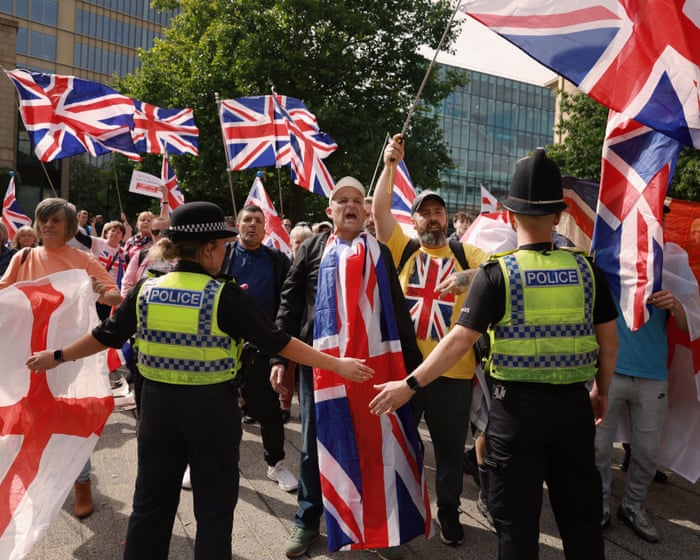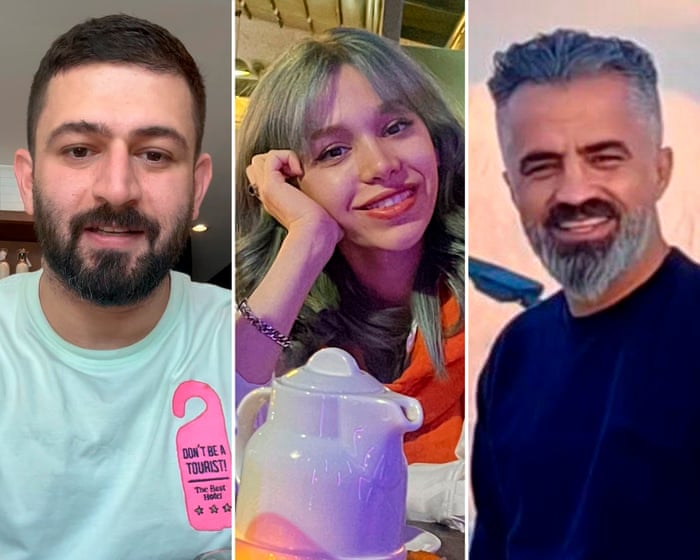Protests against hotels housing asylum seekers have broken out across the UK, with demonstrators clashing with police in several locations. Under the slogan “Abolish Asylum System,” rallies took place in towns and cities across England, including Bristol, Exeter, Tamworth, Cannock, Nuneaton, Liverpool, Wakefield, Newcastle upon Tyne, Horley in Surrey, and Canary Wharf in central London. Protests also occurred in Aberdeen and Perth in Scotland, and in Mold, Wales.
Counterprotests organised by Stand Up to Racism were held in Bristol, Cannock, Leicester, Liverpool, Newcastle, Wakefield, Horley, and Long Eaton in Derbyshire. In Bristol, mounted police were called in to separate opposing groups in Castle Park, where officers scuffled with protesters. Police established a dispersal zone, giving them greater authority to move individuals or groups causing harassment, alarm, or distress. The order will remain in effect until 7 a.m. on Sunday.
A 37-year-old woman was arrested in Bristol on suspicion of assaulting an emergency worker, according to Avon and Somerset police. In Liverpool, 11 people were arrested for offences including being drunk and disorderly, assault, and affray, as a UK Independence Party protest faced a counter-demonstration.
In Horley, Surrey, around 200 anti-immigration protesters, draped in St. George and Union flags, clashed with approximately 50 Stand Up to Racism demonstrators on Bonehurst Road. The anti-racism group chanted, “Say it loud, say it clear, refugees are welcome here,” and held signs calling for solidarity and an end to deportations. They were met with verbal abuse from the anti-migration group, with one person shouting through a megaphone, “You’re all scum and you should be ashamed.”
In Perth, demonstrators and counter-protesters gathered outside the Radisson Blu hotel, where supporters of Abolish Asylum System were met by Perth Against Racism. Stand Up to Racism Scotland claimed a “victory” in the city, with over 200 people turning out to oppose the protest against asylum hotels.
Tensions have been rising over the use of hotels to accommodate asylum seekers. On Tuesday, the High Court granted Epping Forest District Council a temporary injunction to remove asylum seekers from the Bell Hotel in Epping, Essex, starting September 12. Regular protests had been held outside the hotel in recent weeks after an asylum seeker was charged with attempting to kiss a 14-year-old girl, which he denies.
On Friday, the government announced plans to appeal the High Court’s refusal to allow its intervention in the case, as well as to challenge the temporary injunction. Other local councils have also stated they intend to seek legal advice on whether they can obtain similar injunctions for hotels in their areas.
Frequently Asked Questions
Of course Here is a list of FAQs about clashes between police and protesters at UK asylum hotels designed to be clear and helpful
General Understanding Definitions
Q What are asylum hotels and why are people protesting them
A Asylum hotels are regular hotels temporarily housing asylum seekers while their claims are processed People protest for various reasons including concerns about local resources lack of consultation or opposition to immigration policies
Q Who are the main groups involved in these protests
A Typically there are three main groups
1 Protesters This can include both farright groups and concerned local residents
2 Counterprotesters Often antiracism or humanitarian groups supporting the asylum seekers
3 The Police Who are there to keep the peace prevent violence and protect all parties including the hotel residents
Q Why do these protests sometimes turn into clashes with the police
A Clashes usually happen when protesters try to block access to the hotel breach police cordons or become aggressive The police then intervene to uphold the law which can lead to physical confrontations and arrests
Rights Legalities
Q Do people have the right to protest outside these hotels
A Yes the right to peaceful protest is protected in the UK However this right is not absolute Protests must not become violent block highways or involve harassment or intimidation of the asylum seekers inside
Q What laws give the police the power to intervene
A Police can act under several laws primarily the Public Order Act 1986 They can arrest individuals for offences like Breach of the Peace Violent Disorder Affray or public order offences like using threatening or abusive words or behaviour
Q Can the police stop a protest before it even happens
A In some cases yes If the police have intelligence that a protest is likely to cause serious public disorder they can apply for restrictions or conditions under the Public Order Act They cannot ban a protest simply because they disagree with its message
Impact Consequences
Q How do these clashes affect the asylum seekers inside the hotels



